I know the regex for doing a global replace,
%s/old/new/g
How do you go about doing an interactive search-replace in Vim?
I know the regex for doing a global replace,
%s/old/new/g
How do you go about doing an interactive search-replace in Vim?
Add the flag c (in the vim command prompt):
:%s/old/new/gc
will give you a yes/no prompt at each occurrence of 'old'.

Vim's built-in help offers useful info on the options available once substitution with confirmation has been selected. Use:
:h :s
Then scroll to section on confirm options. Screenshot below:
![Text that says "[C] Confirm each substitution. [...] CTRL-Y to scroll the screen down"](../../images/3804892228.webp)
For instance, to substitute this and all remaining matches, use a.
Mark Biek pointed out using:
%s/old/new/gc
for a global search replace with confirmation for each substitution. But, I also enjoy interactively verifying that the old text will match correctly. I first do a search with a regex, then I reuse that pattern:
/old.pattern.to.match
%s//replacement/gc
The s// will use the last search pattern.
I think you're looking for c, eg s/abc/123/gc, this will cause VIM to confirm the replacements. See :help :substitute for more information.
I usually use the find/substitute/next/repeat command :-)
/old<CR>3snew<ESC>n.n.n.n.n.n.n.
That's find "old", substitute 3 characters for "new", find next, repeat substitute, and so on.
It's a pain for massive substitutions but it lets you selectively ignore some occurrences of old (by just pressing n again to find the next one instead of . to repeat a substitution).
If you just want to count the number of occurrences of 'abc' then you can do %s/abc//gn. This doesn't replace anything but just reports the number of occurrences of 'abc'.
If your replacement text needs to change for each matched occurrence (i.e. not simply choosing Yes/No to apply a singular replacement) you can use a Vim plugin I made called interactive-replace.
Neovim now has a feature inccommand which allows you to preview the substitution:
inccommand has two options:
set inccommand=split previews substitutions in a split paneset inccommand=nosplit previews substitution in the active bufferImage taken from: https://medium.com/@eric.burel/stop-using-open-source-5cb19baca44d Documentation of the feature: https://neovim.io/doc/user/options.html#'inccommand'